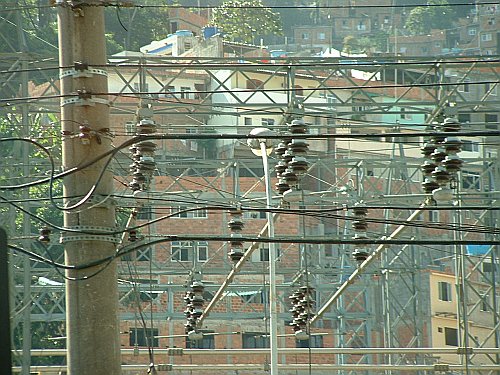Bkgrnd
The past – inequality announcedThe past – inequality announced
According to the historian Sérgio Buarque de Holanda, it was the slavery mentality, of the casa grande e senzala (big house and slave quarters) that fundament Brazilian's modus vivendi. Based on a type of political, economic and social organization artificially maintained by an external force, the Brazilian state brought more continuity than rupture with the model instated by the European colonizer:
"When the independence is declared, the local dominant class nationalize itself with joy, preparing to profit with the autonomous regime, very much like it profited with the colonial. (...) It represented the translate of a political regency, from the king to its son, now settled in rio de janeiro, where it would negotiate the national independence with the hegemonic potency of its time, England" (1)
It is in this sense that cultural, economic and social traces, molded by four hundred years of slavery, structuring itself as a repressive and controlling political-administrative machine, that Brazilian power always benefited an elite, establishing that certain attitudes of the rural patriarchy soon would be common to all the classes as a ideal conducting norm.
By urbanizing forcibly millions of workers and effectively shutting down the knowledge of our rural and indigenous population, of its biodiversity, the richness of our heterogeneous cultural life against the rational systems of organization of work and life, it occurred slowly a complete depersonalization of the Brazilian people and an understanding of its role, inside a society ever more "developed" for a few. A monoculture (agrarian, cultural etc) was stated everywhere in the country, and this homogeneity can testified, for example, by the Portuguese language, adopted freely in all regions.

In modern times, this archaic (des)organization encountered a new form, the military dictatorship. The recent Brazilian democracy inherited from the military period serious economic problems, aggravated by a series of huge external financings (to build national infrastructure). The period called “Brazilian Miracle” actually culminated in the crisis of the external debt in 1982, when the debts, inflation and social tensions started to disseminate all around the country. During the 90’s it was registered the highest inflation in the history of Brazilian economy, 2639% a year.
These tensions of course aggravated the social structure. Disparate income distribution caused violence, a great number of abandoned or working children, and a lot of very young or old women found themselves responsible for entire families without adequate public help. Crime had also organized itself (specially in Rio, where during the dictatorship years political prisoners divided cells with criminals, shaping the first organized criminal faction of the city) and a succession of corruption cases in all levels of power. The judiciary system collapsed, opening doors for impunity, more corruption, narcotraffic and "white collar" (colarinho-branco) crimes.
Currently, the biggest problem of this country is perhaps that a great portion of its population is condemned to live in situations of extreme poverty (over 40% according to IBGE), where mass unemployment and informality cause social exclusion, inside an economy ever more dependent of the centers of global financial capital. This constant dependency has only deepened the contradictions between the privatized state and the Brazilian people. Again according to IBGE 10% of the population richest' income is 30 times superior than the income of 40% of the poorest, being this rich portion of 10% the ones who benefit from 50% of the total national income.
This inequality was historically triggered by the lack of actions and strategies that could influence the decisions related to access and use of resources capable of altering these structures, as much as propose new ones. Illegality in habitation and communication mediums are a result of this lack of compromise with these basic rights. Allied to the economic inequality and political negligence, a bureaucracy reinforces the process that triggers illegality, creating many informal markets ever more powerful.

Our dilemma it is not, and it never was, scarcity but the mode of production and distribution of abundance, that meaning, the inequality - expressed as an economic inequality in the access and use of natural resources, goods and services; the symbolic inequality in the production of knowledge, identity and common values. It is this, and not poverty per se, not a developing but a distributional paradigm, our biggest challenge.
(1) Ribeiro, Darcy “O povo Brasileiro” pg 252
(2) The “Pesquisa Nacional por Amostra de Domicílios” (National Research by domicile samples/ Pnad), from “Instituto Brasileiro de Geografia e Estatística” (Brazilian Institute for Geography and Statistics/ IBGE), revels that workers without a signed work permit represent 46,6 % of the employed population in 2002, higher than the previously observed 43,8 % in 1992.
Bibliography
Barbero, Jesús Martín. Nuevos Regímenes de Visualidad y Des-centramientos Culturales (apostila) Bogotá, Colômbia, 1998.
Ribeiro, Darcy O povo Brasileiro
De Holanda, Sérgio Buarque Raízes do Brasil
Selaimen, Graciela Cúpula Mundial sobre a sociedade da informacão
Santos, Milton O espaço do cidadão, Nobel, 4º edição – SP, 1998
Pignatari, Décio Cultura pós-nacionalista, Imaggo – RJ, 1998
Kunsch e Fishman, Margarida Maria Krohling e Roseli, Organização, Mídia e Tolerância – a ciência construindo caminhos da liberdade,
Kucinski, Bernardo Mídia e democracia no Brasil, EdUsp